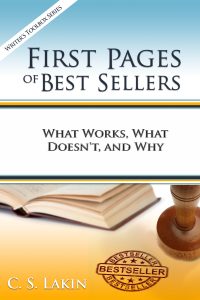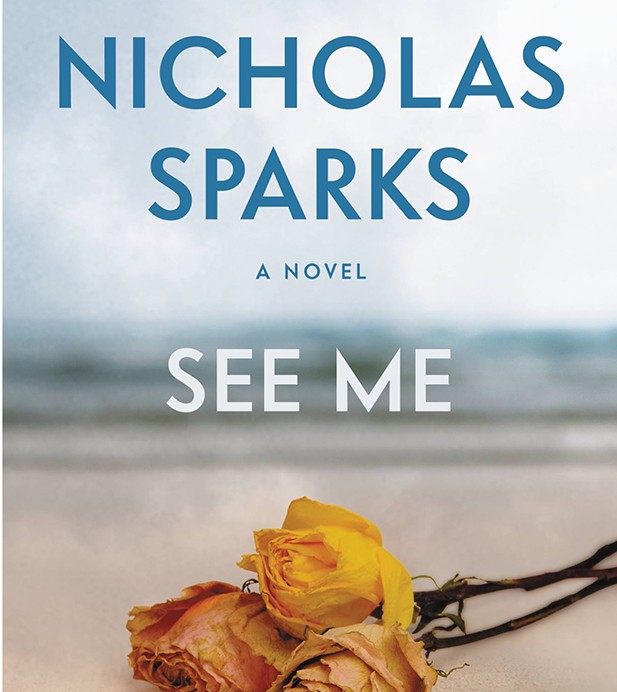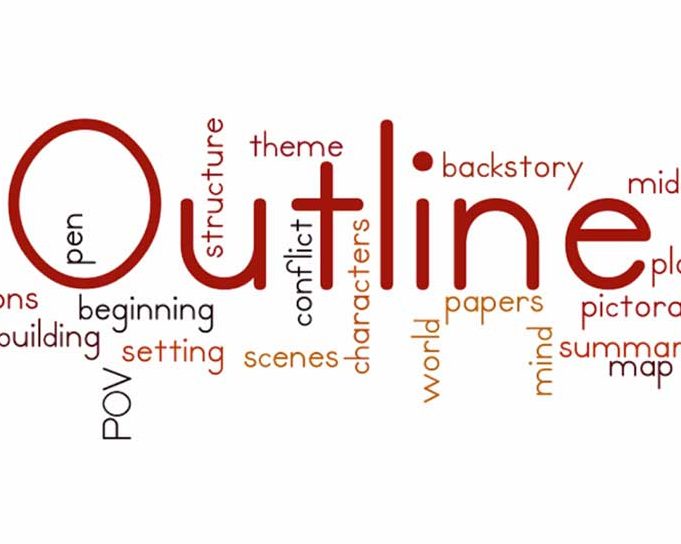First Pages of Best-Selling Novels: See Me
We’re starting off this new year at Live Write Thrive neck-deep into scene structure. Great scenes seem to flow effortlessly from pages of novels, but that’s far from the truth. To craft a terrific scene, a writer must keep in mind a myriad of principles and objectives.
Mondays, we’re dissecting all the components of a great scene, and to help, I’ve created a handy scene checklist (which you can download here). Be sure to subscribe to the blog and read all these posts, as well as the Throwback Thursday posts from past years that tie in with our topic this winter.
On Wednesdays for a couple of months, to further help you nail scene structure, we’ll be looking at first pages of best-selling novels of varying genres.This is our first look at many first pages. I’ll examine what makes these first pages grab readers and pull them into the novel. We’ll be using this first-page checklist to break down the key elements of these effective first pages. Keep in mind, most of what you’ll learn can apply to short stories as well as memoirs and other types of creative nonfiction.
It’s all about telling a story in a way that engages your reader’s brain. To make a brain go into alert mode, some mystery or element of danger, or the incongruous, must cross its path.
The Burden of First Pages
First pages carry a heavy burden in a novel. It’s the make-or-break page for the reader. Many people won’t read past the first page if it fails to engage their interest. So writers need to pay huge attention to the first page—maybe not so much at the first-draft stage, but at some point before that novel is submitted to agents or published.
First pages need to be tight, with concise description, and jump right into dynamic action and hint of conflict. Every word counts, so excess verbiage and unimportant movement and speech must be eliminated.
Readers want to see the scene played out, not be told about it with lengthy narrative and explanation. They don’t want ordinary and predictable. They want their curiosity aroused and their hearts tugged as quickly as possible. They want to latch on to a character who intrigues them and who’s facing challenging circumstances.
All that on the first page? It’s a tall order, but great writers can fill it. You’ll note that not every item on the checklist will show up on page one, but great novels will start off with most of them.
So, let’s dig into our first first page. This one is from New York Times best seller See Me by Nicholas Sparks. The genre: Contemporary Romance, released October 2015. Let’s first read Sparks’s opening page.
Chapter 1
Colin
Colin Hancock stood over the sink in the bathroom at the diner, his shirt raised to better examine the bruise on his ribs. He guessed that it would deepen to a dark purple by the time he woke tomorrow. Even grazing the bruise made him wince, and while he knew from experience that the pain could be overridden for a while, he wondered whether it would hurt to breathe in the morning.
His face, though . . .
That might end up being a problem—not for him, but for others. Certainly his college classmates would stare at him with wide, frightened eyes and whisper about him behind his back, though he doubted that any of them would actually ask him what had happened. During the first few weeks at the university, most of his classmates had seemed nice enough, but it had been clear that none of them knew what to make of him, nor had any tried to speak to him. Not that it bothered him. For one thing, virtually all of them were six or seven years younger than he was, all were female, and he suspected that as far as recent life experiences went, they had little in common with him. In time, like everyone else, they’d end up drawing their own conclusions about him. Frankly, it wasn’t worth worrying about.
Still, he had to admit that he was particularly ghoulish right now. His left eye was swollen and the white of his right eye was a bloody red. There was a gash in the center of his forehead that had been glued back together, and the lead-colored bruise on his right cheekbone resembled a birthmark. His split, swollen lips completed the picture. What he really needed was to put an ice pack on his face as soon as possible if he wanted the girls in his classes to be able to concentrate at all. But first things first; right now, he was starved and he needed fuel. He hadn’t eaten much in the last two days and he’d wanted something fast, convenient, and—if possible—not entirely unhealthy. Unfortunately, at this time of night most places were already closed, so he’d ended up at a run-down diner just off the highway with bars on the windows, water stains on the walls, peeling linoleum on the floor and booths held together with duct tape. But if the place had one saving grace, it was that none of the other customers cared how he looked when he made his way to the table. People who came to dives like this late at night were good at minding their own business. As far as he could tell, half the people here were trying to sober up after a night of hard drinking, while the other half—designated drivers, no doubt—were sobering up, too, only marginally less intoxicated.
Why This Works
Let’s use the first-page checklist and run through the key elements on this first page to see why this novel starts off strong.
Opening Hook: Clever writing and image that grabs the reader – The image of a character staring at himself in a mirror—his body beaten and bruised—draws the reader into the story. We immediately want to know what happened and why.
Introduction of main character in first few lines: The protagonist is introduced in the first sentence, Colin Hancock, written in third person from Colin’s POV. In the first page we learn he’s been in a fight, is a college student and older than most of the other students, and hasn’t eaten in a couple of days. All information that makes the reader wonder who he is and what’s happened to him—a continuation of the hook.
Starting the story in the middle of something that’s happened (or happening): Yes, there’s just been a fight of some sort.
A nod to setting; avoid excessive exposition or narrative: The setting for the opening scene is a diner. But there’s no sense of where the diner is or where the story takes place. Sparks shows the diner through description: “a run-down diner just off the highway with bars on the windows, water stains on the walls, peeling linoleum on the floor and booths held together with duct tape.”
A catalyst, inciting incident, or complication introduced for your character: The fight is the inciting incident for the opening. He’s wounded and hungry—hasn’t eaten in two days—those are the immediate complications he faces. He is also concerned about how his appearance will bother his classmates.
A hint at character’s immediate intentions: He needs to eat.
A hint at character’s hidden need, desire, goal, dream, fear: Possibly—based on the title and his thoughts about his female classmates—the way they’ve seemed to avoid him, haven’t spoken to him, etc., the reader might guess at this point that although he denies it, he has a desire for acceptance—a need to be seen.
Unique voice/writing style: Nothing that stands out. Sparks’s writing is straightforward. But it’s appropriate for his genre.
Setting the tone for the book: The tone isn’t very strong. It’s clear it’s a serious-enough story, and the first page starts to give indication of the tone and voice. But I wouldn’t say there’s anything compelling here.
A glimpse at character’s personal history, personality—shed light on motivation: The only hint the reader is given about Colin’s personality is that there seems to be a false bravado he operates under. He notices the slight of his classmates, but doesn’t care—says it doesn’t bother him—isn’t worth worrying about. But he seems to be worrying about it.
Hint of character’s initial plot goal: No hint of this being a romance novel, other than he mentions the girls in his classes. No hint of the inner motivation yet that will push him toward his goal (but that’s not often shown on page one).
A course of action/decision implied. Introduction of high stakes/dramatic tension: His need to eat and the question of why he was in a fight begin the dramatic tension. Clearly something is at stake if he’s willing to fight (his integrity, his pride, etc.).
Pacing—jumps right into present action. No backstory: No backstory here, but not much action either. However it does show the character in the present moment.
- One characteristic to reveal that makes your character heroic and vulnerable: Again, he may be vulnerable to what others think of him, though he denies it.
- One element of mystery, something hinted at that raises curiosity: Colin states, in reference to his classmates “In time, like everyone else, they’d end up drawing their own conclusions about him.” This hint at previous rejection raises curiosity. The author does a good job of parceling information—giving just enough to keep the reader wondering and therefore turning pages.
- One element out of the ordinary, unusual, that makes the book different/stand out: That he thinks his battered face will be a problem for others and not himself. And his concern that the girls in school will be able to “concentrate” at all (on him or the class).
- Concise, catchy dialogue (if in the first scene) that is not boring or predictable: No dialogue included in the first page.
- A hint at theme: Based on the title, See Me, and references to him looking at himself in a mirror, his concern about how his appearance will affect his classmates, and his assumed ambivalence of the other diner patrons who he doesn’t think will notice him, there may be a theme of rejection—of not being seen.
What Could Have Been Better
While I’d consider this opening page okay and interesting enough to keep reading a bit more, I’d want to see some dynamic action happening fairly quickly. He’s standing there looking in the mirror, and having characters standing around thinking, while potentially revealing and engaging, gets old fast if things don’t start happening. So keep that in mind when crafting your opening scene.
Here’s the first paragraph of the synopsis at the author’s website:
Colin Hancock is giving his second chance his best shot. With a history of violence and bad decisions behind him and the threat of prison dogging his every step, he’s determined to walk a straight line. To Colin, that means applying himself single-mindedly toward his teaching degree and avoiding everything that proved destructive in his earlier life. Reminding himself daily of his hard-earned lessons, the last thing he is looking for is a serious relationship.
In my opinion, that first page could have hinted at his prison past, his regret over bad decisions, his determination to get “life right” this time. It could also hint at his core need and immediate goal, which is to get that teaching degree and push away thoughts of romantic entanglement. Honestly, even hinting that a serious relationship is “the last thing he is looking for” can easily be brought out on the first page.
I know—he’s a best-selling author, so who am I to tell him how to write? I’ll probably seem a bit arrogant in these posts when I point out how they could have been written better. But my aim here is to help you see how you might create great first pages.
A Word about Plot Goals
Note: it shouldn’t be expected that any specific plot goal would be mentioned or set up this early. However, right from the start, elements can introduced that are intended to lead toward the introduction of the character’s initial primary goal in his life. Usually that core need is pressing him toward some visible goal at the opening of a novel.
When the initial disturbance, opportunity, or inciting incident occurs (call it what you will) at around the 10% mark, the character will start veering in a more specific direction that will set the compass for the novel. Adept novelists can include elements even on page one that start setting this up. Usually seeing a character in her ordinary world reveals a specific problem and accompanying attitude toward that problem that the future plot goal will connect to.
These are all things you can watch for as you read novels and study the way the authors set up their stories.
What are your thoughts about this opening page? What works to you? What doesn’t and why? Share in the comments!
 Want to read all the analyses of best-seller first pages on Live Write Thrive?
Want to read all the analyses of best-seller first pages on Live Write Thrive?
Get the compiled collection of posts, along with additional insights and instruction that will help your first pages rock!
First Pages of Best Sellers: What Works, What Doesn’t, and Why is available in Kindle ebook and paperback! Get yours HERE!












Really interesting analysis and helpful advice, thank you!
And most importantly, the really great novels don’t try too hard at all this – if you’re telling a good story and you write it well (or have the help of a good editor) a lot of these pieces will fall into place naturally without having to take too much of a formulaic, checklist approach.
Thanks for the checklist and for doing this series. I love how you broke this chapter down and look forward to more analysis.
Great article and good timing.
Beginning writers need to know the rules and how to apply them in order to learn how to break them.
But it’s worth while to point out that after an author has established a voice, tone, and fan base, it’s not always necessary to pay strict attention to the rules.
I’ve read enough Nicholas Sparks, for example, to know what I can expect even if the first page is slow (or appears to be.)
Mr. Sparks also has enough die-hard fans promoting his books to friends, neighbors, relatives, reading buddies, and others that the risk of turning people away with a first page seems minimal.
In other words, every writer has to balance the rules for writing with what their fans already expect of them. If it’s working (and I’d say it’s working for Mr. Sparks), don’t fix it.
But I’m not Nicholas Sparks, so I downloaded both of the checklists you linked to and look forward to putting them to use on my next second draft!
Thanks again for a great post and wonderful instruction.
Carrie Lynn Lewis
Great points, Carrie. I make that point a lot–that an author’s faithful fans might be a bit forgiving. I’ve read entire books I didn’t like just because I love the author. But I wouldn’t do that with many other authors. And I usually won’t read past page 1, famous author or not, if the first page bores me. My aim in this blog is to help writers learn the best technique to give them the best advantage for a successful story. On another note, just because an author becomes successful, should she really then not care about her opening pages, trusting readers will be forgiving if they are badly written or boring? I think you hit is head-on by saying you have to know your fans and what they expect, then do your best to deliver in the most proficient and creative way.
I agree with all of your points. Becoming successful is no reason to slack off on quality.
But that is a factor in determining whether or not die hard fans are more likely to read past an average or even poorly written first page if they know and trust the author.
Besides, while every author will produce clunkers, it seems more likely that any poor response from a reader who is also a die hard fan will have more to do with the unique chemistry of reader, current life situation, and topic of novel, than with the writer’s skill.
Still, I yield to your purpose for this series, which is to help writers write the best novels they can. For that, keep up the good work.
Thanks for those comments, Carrie.
I’m a big Nicholas Sparks fan, but I feel he’s missed the mark on this opening. I was surprised when I read the blurb. The opening scene didn’t seem to relate to the blurb at all.
It is my intention to learn how to craft a good story in 2016. I’ll be following you closely for a feel you hit the issue on the head.
I’ve been under the impression for quite a while that having a character look in the mirror is a big no-no and it now turns me off. I’m not a reader of romance and haven’t read any of his books and that page doesn’t entice me to start. I don’t think you’re arrogant to pick holes in it – it seems lazy to me.
Thanks for your honest look at this first page. I agree with your appraisal. Often said is not to put your character in front of a mirror. Having read and enjoyed previous novels by the author, I’m surprised at this beginning.
What I found most helpful about this post was seeing the ‘First Page checklist’ in action. In particular it had never occurred to me to start with a hint of mystery right from the outset. So –– thank you for this. I’m downloading this checklist, to go with the excellent scene checklist! Thank you.
Glad you find it helpful. We’ll be looking at about a dozen first pages in upcoming weeks so stay tuned in and join in the discussion!
Here’s my first page, trying to make it cover as much as possible as per your list
Mark Bishop sighed deeply as he gently placed the urn next to the other three in his study. Glancing at David’s boxes of personal effects on the floor he slowly walked to the office.
Bill Marsh, his farm manager was waiting for him and told him the new tax advisor would be coming on Friday, “This ‘un apparently has a farming background and is supposed t’ know how to get grants an ‘all.”
“Well, can’t be any worse than the last chap. He was bloody useless. You’d have thought he worked for the damn Tax Man!” Mark complained. “Mind you, any grants we can get will be really handy,” Mark sighed.
“If yer’d not spent so much adding all them extra rooms t’ farmhouse and all that expensive furniture yer’d a’ bin better off.”
“Don’t remind me,” he grunted. “I thought it’d be a decent place to live, away from all the bullshit, where I could raise my own family.”
“Yeah and we know what happened then!” As Mark’s jaw clenched at the reminder, Bill quickly continued, “Anyroad, there’s still quite a bit to do before we let the girls out t’ graze. There’s some fence posts need replacing, the last bit of hedge row to check and …”